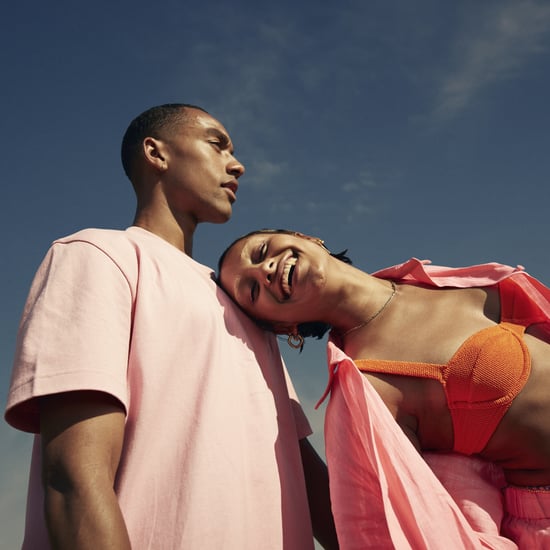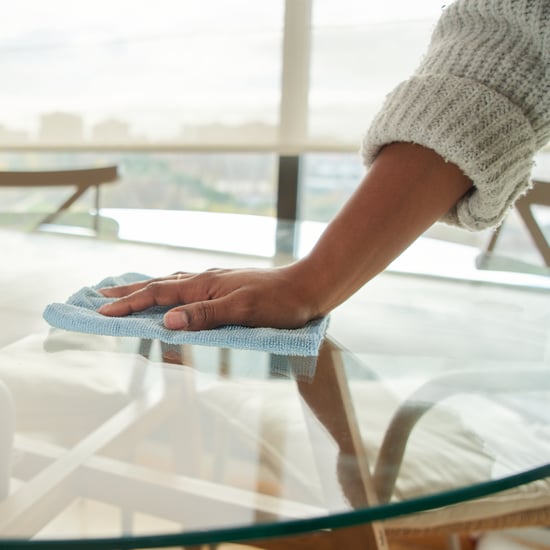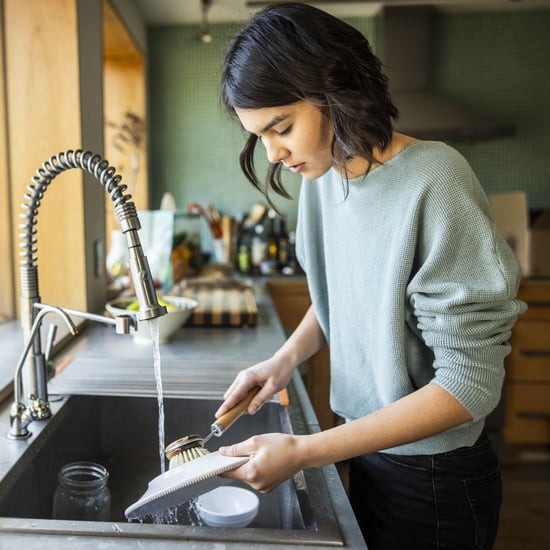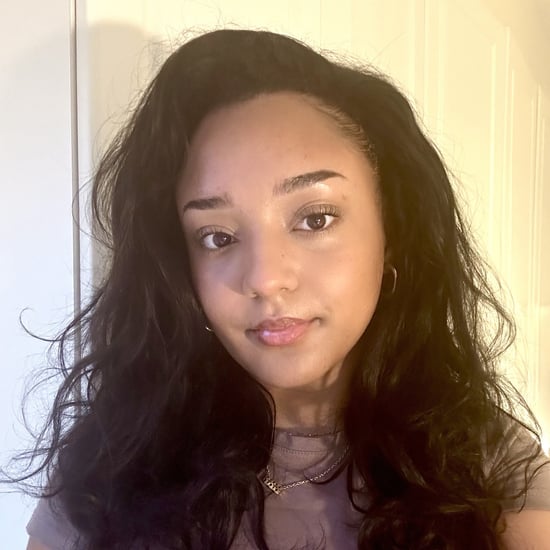TikTok Duo Sara and Avni Open Up About Oversharing Online
TikTok Duo Sara and Avni Want to Help You Balance Online and Offline Life
Image Source: YouTube Spotlight UK
The internet can be a scary place: one where faceless trolls leave negative comments, the lines between personal and public lives are blurred, and where there are no boundaries or guidelines for how to use it. Particularly for young people in the growing age of content creation, there's an increased pressure to create and document all parts of their lives and not a lot of guidance on how to protect themselves in the process. Iconicakes is a TikTok duo made up of real-life sisters Sara and Avni, both of whom have struggled with the pressure to create, the risk of oversharing online, and trying to create healthy boundaries with social media. The pair recently partnered with YouTube for its latest online series called ReFrame, which aims to help teach young people the skills they need to exist online safely. Episode five of the series stars Sara and Avni, and we caught up with them to talk about finding a balance between online and offline life.
POPSUGAR: Tell us a bit about how you got started?
Sara: We started filming videos about our lives, just us having a good time, showing our experiences and what we go through, and documenting day-to-day activities. Initially, it was just a way to find other people like us. We came to this country when we were 8 and 10, and there weren't many of us, so it was just a nice way to reach out. It became a small group of friends, and then the friendship group just grew, and we still film our lives.
PS: What was the reception from your family like when you started posting online?
S: Before we started, we didn't explicitly say that we were going to film content. We just did it, and eventually, my mum was like, "hold on, what's going on?", and I explained it to her, and obviously she had the typical mum reaction of "no, you should study, get off your phone". I was like, but look, I've made all these new friends. We had times where people would find our videos on their explore page, and I think quite often before you gain momentum, people scrutinise it, and then once you gain momentum, it's a different story.
A: For us, it was a bit of a learning curve. For me especially, because I was in the throes of secondary school. People would start drama for no reason, and when you're a kid in that environment, making videos online, putting yourself on blast, and maybe not making the greatest content yet, it doesn't always work very well for you. I don't know how we had it in us, but there was just this perseverance of just saying, "I don't care what anybody thinks, because I care about what I'm doing, and that's all that matters". The reaction was a mixed bag basically.
 Image Source: YouTube Spotlight UK
Image Source: YouTube Spotlight UK
PS: What was it like trying to juggle that online attention while you were still going to school and living very offline lives, too?
A: It was just a part of our identity in the same way that for somebody who likes sports, it's a part of their identity. Because I'd grown up with these people for a very long time, especially in school, it was kind of easier for them to accept. Also, with the sort of concept of making videos online, you're going to have to make sacrifices in the same way that you have to make sacrifices if you're doing any other extracurricular activity. For me, that sacrifice was, people are going to know me before I go to places.
S: I felt the brunt of that when I started university and people already knew me before I got to make friends with them, so someone would have an idea of me already. I'm obviously not going to be entertaining all the time, I'm going to have my off days and show up gross to university in my pyjamas, and I'm going to not want to talk to anyone. That was hard because people would already have a concept of me before [meeting me].
A: It's about managing that online and offline life in terms of being able to juggle this full-time sort of job making videos, school and external pressure from outside people, as well as internal pressure from your followers. It was a lot to manage, but it's a privilege to have that much to manage, in our opinion anyway.
"There will never be an off button until you manually switch it off. Nobody's going to tell you what the boundary is, because that's not how the internet works."
PS: Definitely, that balance is so important. So what made you want to get involved in YouTube's Reframe series?
S: For me personally, I think it's really important to just discuss the concepts of balance in general, because as much as we all know how much the internet impacts us, we don't talk about it enough because we're consumed by it all the time. There's no concept of "how do I balance this out?" because it's not seen as a problem.
A: Also, starting to introduce this young, like 13-15, is great because of the fact that we didn't have any guidelines when we were that age. There was a free rein to do what you want [back then], and there still is, but it's even bigger now than it was when we were younger. I just want to protect them, give them a little bit of a safety bubble and a little bit of a guideline.
PS: With that in mind, how do you deal with criticism online?
S: Because it's online, there's anonymity, so people get more bold and you could say anything you want to say, but understanding that there's a person behind that comment usually helps, because it helps you humanise it. A mean comment never really comes from a mean place. It comes from insecurity and not feeling good about yourself. You know that when you're having an interaction with a person in real life, but it's hard to gauge that knowledge when you're just looking at a comment. So it's understanding that oh no, this isn't about me. It's about them, and that's OK.
 Image Source: YouTube Spotlight UK
Image Source: YouTube Spotlight UK
PS: How do you balance connecting with your followers without oversharing or feeling like no matter what you're doing, there has to be evidence of it on social?
S: I definitely struggled when we started filming ourselves a lot more just hanging out, because we had to really figure out what goes on camera and what doesn't. When you are very close to your following and it's not based on any talent, like I'm not out there teaching people to do makeup — I want to share everything, but I shouldn't. Everyone needs to have some balance in their life. We'd spend time with our family and spend time with our friends without documenting it. I don't think there are many videos with our friends online at all, just because we keep that part for us. Avni and I, we decided to make sure that once a week, her and I just go out, get some food, get some drinks, and just hang out and not film it. It's a good way to maintain our sisterly relationship as well.
PS: Definitely, that level of communication is so important, isn't it? It's really easy to put loads of your personal intimate relationship stuff out there.
A: A rapper once said something that really resonated with me. He said that the internet and people and this industry is always going to take whatever you give them. Literally anything that you give them, and there's not going to ever be a stopping point — they're just going to take and take. Sometimes you just have to be like, "no, because this is for me, and this is my time, and this is what I'm taking, because I want to keep this, and not everything needs to be said". It's about understanding that there will never be an off button until you manually switch it off. Nobody's going to tell you what the boundary is, because that's not how the internet works.
"There's a really fine line between making videos about your life and then making your life about videos."
PS: Finally, what advice would you give to other young people who struggle with creating those boundaries?
S: I remember right after we came out of a lockdown, I was so used to being on my phone and just watching Netflix, and essentially, that was my entire source of entertainment and dopamine. I was like, "Oh my god, Avni, I feel really bad right now because I have nothing to do", and she said "Just go to a class. Go to a dancing class — do something". I remember thinking, oh right, my phone can't be my entire identity right now. It needs to be a part of your life, but not your entire life. If I slowly fell out of love with an idea for a video, I wouldn't enjoy my week, and that was such a paradoxical relationship I would have with it. So I had to step back and realise that OK, whilst I'm doing this, I need to do other things. I need to have a life. I need to make content around my life rather than make content my life.
A: It's about setting up your relationship with social media in a way where you understand that it can't be your whole life. You need to have other hobbies. There's a life outside of your phone, so build that life outside as much as you build your life on the internet. There's a really fine line between making videos about your life and then making your life about videos.







